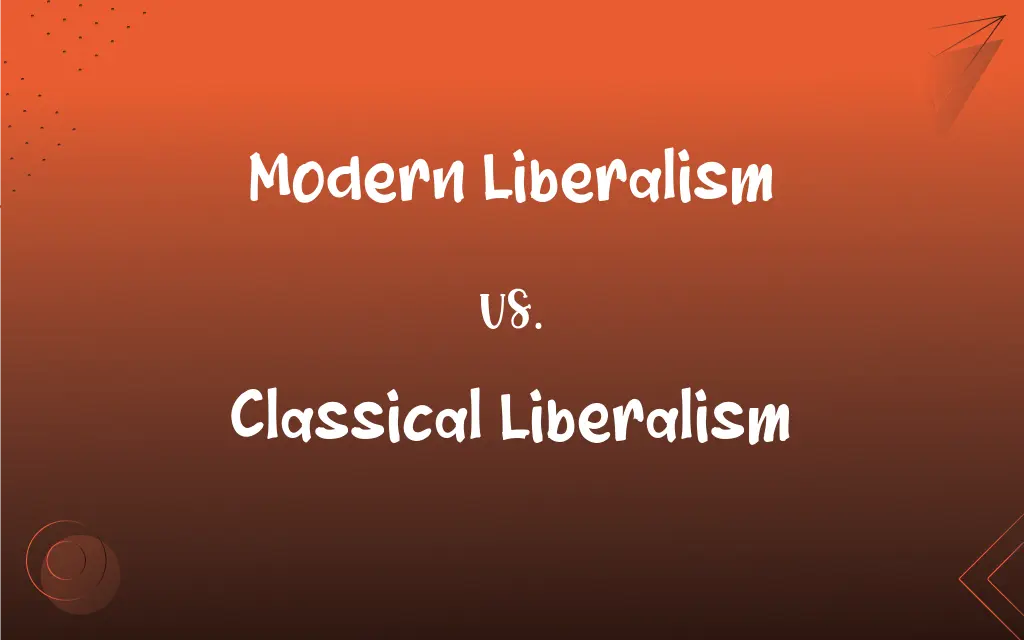Modern Liberalism vs. Classical Liberalism: What's the Difference?
Edited by Aimie Carlson || By Janet White || Published on January 13, 2024
Modern Liberalism advocates for government intervention in social and economic affairs to promote equality. Classical Liberalism emphasizes individual freedom, limited government, and free market principles.

Key Differences
Modern liberalism supports an active role for government in society, emphasizing social welfare and equality. Classical liberalism focuses on individual freedoms, advocating minimal government intervention in lives and markets.
Modern liberalism endorses regulations and policies to address social injustices and economic disparities. Classical liberalism holds that free markets and limited government lead to the best outcomes for society.
Modern liberalism often supports social safety nets like healthcare and education. Classical liberalism places high value on property rights and economic freedom.
In modern liberalism, taxes are seen as a tool for redistributing wealth and funding public services. Classical liberalism advocates for lower taxes and smaller government, emphasizing self-reliance.
Modern liberalism is associated with progressive social policies. Classical liberalism champions individual liberty and skepticism of state power.
ADVERTISEMENT
Comparison Chart
Government Role
Active in social/economic issues
Minimal intervention
Economic Views
Regulated markets, wealth redistribution
Free markets, economic freedom
Social Policies
Supports social safety nets
Emphasizes individual responsibility
Taxation
For wealth redistribution, public services
Lower taxes, small government
Values
Equality, social welfare
Individual liberty, property rights
ADVERTISEMENT
Modern Liberalism and Classical Liberalism Definitions
Modern Liberalism
Emphasizes social safety nets and welfare programs.
Under modern liberalism, welfare reforms are crucial.
Classical Liberalism
Supports free market principles.
Under classical liberalism, free trade is key.
Modern Liberalism
Promotes progressive social policies.
Modern liberalism champions LGBTQ+ rights.
Classical Liberalism
Emphasizes individual freedom and limited government.
Classical liberalism advocates for personal liberties.
Modern Liberalism
Supports regulated markets for fairness.
Modern liberalism calls for stricter financial regulations.
Classical Liberalism
Advocates for minimal state intervention.
Classical liberalism opposes excessive regulatory policies.
Modern Liberalism
Seeks to reduce economic disparities.
Modern liberalism often proposes progressive tax policies.
Classical Liberalism
Values property rights and economic independence.
Property rights are a cornerstone of classical liberalism.
Modern Liberalism
Advocates government intervention for social equality.
Modern liberalism supports universal healthcare.
Classical Liberalism
Prefers lower taxes and smaller government.
Classical liberalism calls for tax cuts and reduced government spending.
FAQs
What defines classical liberalism?
Classical liberalism is characterized by its emphasis on individual freedom, limited government, and free market economics.
How do classical liberals view the economy?
Classical liberals believe in free markets and minimal state interference in economic affairs.
How do modern and classical liberalism view government roles?
Modern liberalism supports a proactive government role, while classical liberalism advocates minimal government intervention.
What is the modern liberal stance on social welfare?
Modern liberals support strong social welfare programs to address inequality.
What is modern liberalism?
Modern liberalism advocates for government intervention to promote social equality and welfare.
What’s classical liberalism’s stance on property rights?
Classical liberalism places a high value on property rights and economic independence.
Can modern liberalism include market regulations?
Yes, modern liberalism often involves regulating markets for fairness and consumer protection.
How does modern liberalism address economic disparities?
Through progressive taxation and welfare programs.
Do modern liberals support higher taxes?
Yes, modern liberals often support higher taxes for wealth redistribution and funding public services.
How do modern liberals approach social issues?
Modern liberals typically support progressive policies on issues like LGBTQ+ rights and racial equality.
Do classical liberals support social safety nets?
Classical liberals generally prioritize individual responsibility over extensive social safety nets.
What’s the classical liberal approach to individual rights?
Classical liberalism strongly advocates for individual rights and freedoms.
What is the classical liberal view on taxation?
Classical liberalism advocates for lower taxes and smaller government.
How do modern and classical liberalism view state power?
Modern liberalism is more accepting of state power for societal goals, while classical liberalism is skeptical of it.
Are modern liberals in favor of free trade?
Modern liberals may support free trade but with regulations for fair practices.
What’s the modern liberal view on healthcare?
Modern liberalism often supports universal healthcare systems.
Do classical liberals believe in a welfare state?
Classical liberalism generally opposes extensive welfare states, focusing on market solutions.
How do classical liberals view government spending?
They typically advocate for reduced government spending.
Is modern liberalism the same as socialism?
No, modern liberalism is not socialism, though it supports more government intervention than classical liberalism.
Can modern liberalism include environmental regulations?
Yes, modern liberalism often supports environmental regulations to address issues like climate change.
About Author
Written by
Janet WhiteJanet White has been an esteemed writer and blogger for Difference Wiki. Holding a Master's degree in Science and Medical Journalism from the prestigious Boston University, she has consistently demonstrated her expertise and passion for her field. When she's not immersed in her work, Janet relishes her time exercising, delving into a good book, and cherishing moments with friends and family.
Edited by
Aimie CarlsonAimie Carlson, holding a master's degree in English literature, is a fervent English language enthusiast. She lends her writing talents to Difference Wiki, a prominent website that specializes in comparisons, offering readers insightful analyses that both captivate and inform.






































































